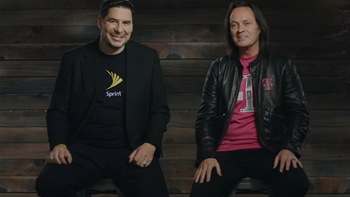FCC Chairman Pai recommends approval of T-Mobile-Sprint Merger

Earlier today, we told you about the concessions that T-Mobile and Sprint have agreed to, hoping to get necessary approval of the FCC and Justice Department for their $26.5 billion merger. T-Mobile and Sprint will complete their 5G rollout in three years, freeze prices at current levels during that time period, and sell Boost Mobile. According to Reuters, it appears that the proposal has won over FCC Chairman Ajit Pai.
Pai said today that he will recommend that the other four FCC Commissioners also approve the merger. One of the remaining four, Brendan Carr, has already announced that he will vote in favor of the transaction. But before any final tally is taken, the FCC must first draft an order. Once that occurs, the full panel must vote to approve or reject the merger, which was originally announced in April 2018.
Even if the FCC votes to approve the deal, both companies still need approval from the DOJ. That regulatory agency is concerned that the merger will reduce competition with the combination of the nation's third and fourth largest wireless providers. Some would argue that combining the rapidly growing T-Mobile with Sprint will produce a new mobile powerhouse that would put more pressure on Verizon and AT&T than if the deal was rejected.
T-Mobile and Sprint are getting closer to merging
Back in 2011, when T-Mobile was the nation's fourth-largest carrier but practically irrelevant in the states, AT&T agreed to buy the company for $39 billion. That deal faced intense regulatory scrutiny and was blocked by the Justice Department. As a result, AT&T backed out of the deal and was forced to hand over $3 billion and 128 AWS markets to T-Mobile under the terms of their agreement. Then, in 2014, Sprint and T-Mobile raised the idea of a merger as a trial balloon with the FCC and DOJ. Both agencies basically told the two companies not to bother.
Now, with T-Mobile the most innovative and fastest growing of the four major U.S. wireless operators, it no longer needs a merger to survive. However, with the next generation of wireless connectivity in its very early days, Sprint's hoard of mid-range 2.5GHz spectrum happens to mesh well with T-Mobile's low-band treasure trove of 600MHz airwaves. And despite having a deep-pocketed parent in Japan's SoftBank, Sprint has been struggling for a few years now. Speaking of deep-pocketed parents, T-Mobile is majority owned by Germany's Deutsche Telekom. After the merger, the latter will own 42% of the combined company while the former will have a 27% stake.
If the deal is approved by the FCC, which seems likely, and the Justice Department also concurs, both companies will have until July 29th to close the transaction unless it is extended again. The original deadline for closing the deal was pushed back from April 28th to July 29th. Part of the delay was due to changes that T-Mobile made to documents it filed with the FCC regarding projections it made related to the merger. The FCC also had to halt its review during the government shutdown, which lasted a little over one month, and again in March to allow consumers to comment on the transaction.
The Communications Workers of America (CWA) union complained that the deal will result in the loss of 28,000 jobs, mostly from the shuttering of overlapping stores. T-Mobile CEO John Legere says that with the number of new customer service operators needed to man the phones, the deal will add 3,000 new employees in year one and 11,000 by 2024.
So with one regulatory agency down and one to go, T-Mobile and Sprint merger are so close to completing their merger that it might be time to order the new stationery.










Things that are NOT allowed: